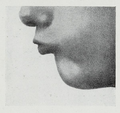Mentalis
| Mentalis | |
|---|---|
 Muscles of the head, face, and neck. | |
| Details | |
| Origin | Anterior mandible |
| Insertion | Chin |
| Nerve | Mandibular branch of facial nerve |
| Actions | Elevates and wrinkles skin of chin, protrudes lower lip |
| Identifiers | |
| Latin | musculus mentalis |
| TA98 | A04.1.03.037 |
| TA2 | 2087 |
| FMA | 46825 |
| Anatomical terms of muscle | |
The mentalis muscle is a paired central muscle of the lower lip, situated at the tip of the chin.[1] It originates from the mentum of the mandible, and inserts into the soft tissue of the chin. It is sometimes referred to as the "pouting muscle" (as in duck face) due to it raising the lower lip and causing chin wrinkles.
Structure
[edit]The mentalis muscle originates from the mental protuberance of the mandible near the midline.[2][3] It inserts into the soft tissue and skin of the chin.[2][3]
Function
[edit]The mentalis muscle causes a weak upward-inward movement of the soft tissue complex of the chin.[2] This raises the central portion of the lower lip.[2] In the setting of lip incompetence (the upper and lower lips not touching each other at rest), the contraction of the mentalis muscle can bring temporary but strained oral competence.
In conjunction with the orbicularis oris muscle (for the upper lip), the mentalis muscle allows the lips to "pout". Externally, contraction of the mentalis muscle causes wrinkling and dimpling of the skin on the chin, as used in expressions of doubt or displeasure.[4]
Clinical significance
[edit]The mentalis muscle can be easily assessed using ultrasound.[5]
Geniospasm
[edit]Geniospasm is a genetic movement disorder of the mentalis muscle.[6] It involves repetitive contraction of the muscle, with episodes lasting between seconds and hours.[6] Certain medications may be used to treat it, such as haloperidol and benzodiazepines.[6] Injection of botulinum toxin (to temporarily paralyse the muscle) may be more effective.[6]
Cosmetics
[edit]The mentalis muscle may be partially paralysed using botulinum toxin to reduce wrinkling of the skin of the chin.[4] This may be done for cosmetic purposes.[4]
Additional images
[edit]-
Outer surface of mandible. Mentalis is indicated by the red circle at left.
-
Position of mentalis (red)
-
Action of the mentalis muscle
References
[edit]- ^ Lips and Perioral Region Anatomy at eMedicine
- ^ a b c d Hussain, G.; Manktelow, R.T; Tomat, L.R (2004-09-01). "Depressor labii inferioris resection: an effective treatment for marginal mandibular nerve paralysis". British Journal of Plastic Surgery. 57 (6): 502–510. doi:10.1016/j.bjps.2004.04.003. ISSN 0007-1226. PMID 15308395.
- ^ a b Zide, Barry M. (March 2000). "The Mentalis Muscle: An Essential Component of Chin and Lower Lip Position". Plastic and Reconstructive Surgery. 105 (3): 1213–1215. doi:10.1097/00006534-200003000-00061. ISSN 0032-1052. PMID 10724283.
- ^ a b c Glaser, Dee Anna (2009). "26 - Botulinum Neurotoxin for Dermatologic and Cosmetic Disorders". Botulinum toxin: therapeutic clinical practice and science. Philadelphia: Saunders. pp. 324–338. doi:10.1016/B978-1-4160-4928-9.00026-3. ISBN 978-1-4377-1119-6. OCLC 460883288.
- ^ Volk, Gerd Fabian; Wystub, Nadja; Pohlmann, Martin; Finkensieper, Mira; Chalmers, Heather J.; Guntinas-Lichius, Orlando (2013). "Quantitative ultrasonography of facial muscles". Muscle & Nerve. 47 (6): 878–883. doi:10.1002/mus.23693. ISSN 1097-4598. PMID 23519888. S2CID 39807522.
- ^ a b c d Deuschl, Günther; Fasano, Alfonso (2009). "29 - Essential Tremor and Other Tremors". Movement Disorders 4 (1st ed.). Philadelphia: Saunders / Elsevier. pp. 506–557. doi:10.1016/B978-1-4160-6641-5.00029-5. ISBN 978-1-4160-6641-5. OCLC 460904302.



